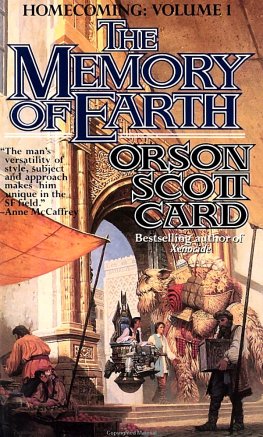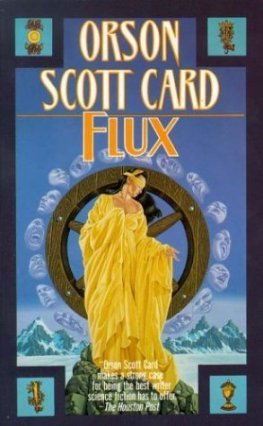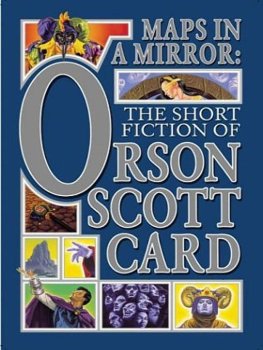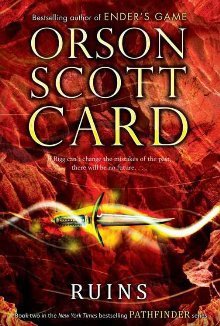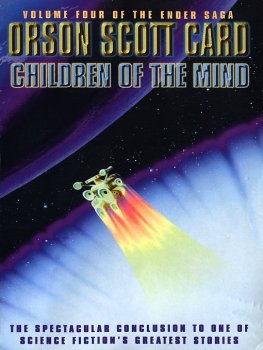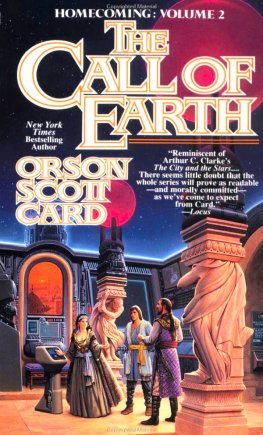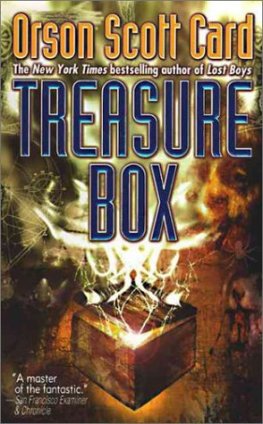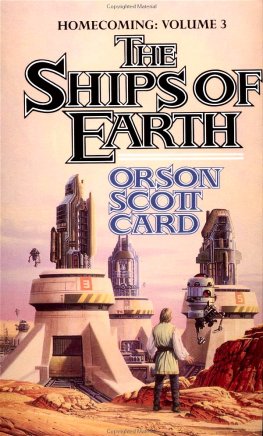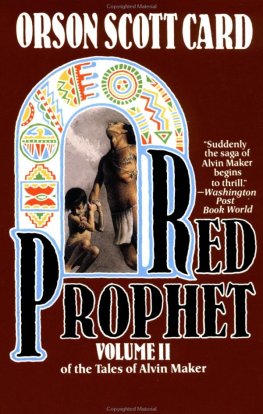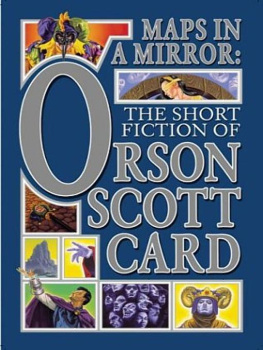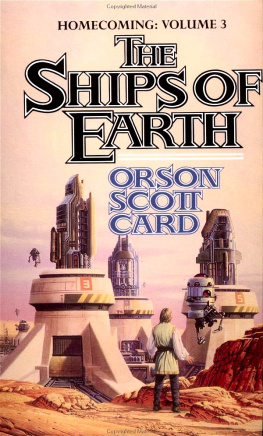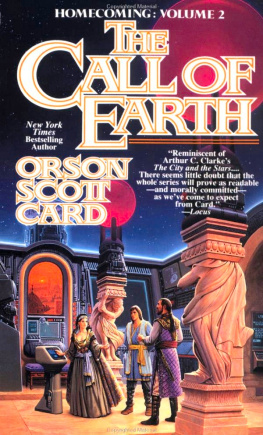Orson Card - The Memory of Earth
Here you can read online Orson Card - The Memory of Earth full text of the book (entire story) in english for free. Download pdf and epub, get meaning, cover and reviews about this ebook. genre: Science fiction. Description of the work, (preface) as well as reviews are available. Best literature library LitArk.com created for fans of good reading and offers a wide selection of genres:
Romance novel
Science fiction
Adventure
Detective
Science
History
Home and family
Prose
Art
Politics
Computer
Non-fiction
Religion
Business
Children
Humor
Choose a favorite category and find really read worthwhile books. Enjoy immersion in the world of imagination, feel the emotions of the characters or learn something new for yourself, make an fascinating discovery.
- Book:The Memory of Earth
- Author:
- Genre:
- Rating:4 / 5
- Favourites:Add to favourites
- Your mark:
- 80
- 1
- 2
- 3
- 4
- 5
The Memory of Earth: summary, description and annotation
We offer to read an annotation, description, summary or preface (depends on what the author of the book "The Memory of Earth" wrote himself). If you haven't found the necessary information about the book — write in the comments, we will try to find it.
The Memory of Earth — read online for free the complete book (whole text) full work
Below is the text of the book, divided by pages. System saving the place of the last page read, allows you to conveniently read the book "The Memory of Earth" online for free, without having to search again every time where you left off. Put a bookmark, and you can go to the page where you finished reading at any time.
Font size:
Interval:
Bookmark:
Orson Scott Card
The Memory of Earth
ACKNOWLEDGMENTS
I owe many debts in the creation of this work, some more obvious than others.
My wife, Kristine, as always was my reader of first resort; with this book, however, she was joined in this labor by our oldest son, Geoffrey, who proved himself to be a reader of great insight and an editor with a good eye for detail. The world has too few good editors. I'm proud to have found another one.
I must also thank the many friends working with me on other projects, who waited patiently until this book was finished, so that I could return to other labors too long delayed. And thanks, again and always, to my agent, Barbara Bova, who proves that it is possible to do good business with a good friend
NICKNAMES
Most names have diminutive or familiar forms. For instance, Gaballufix's near kin, close friends, current mate, and former mates could call him Gabya. Other nicknames are listed here. (Again, because these names are so unfamiliar, names of female characters are set off in italics.):
Dhelembuvex-Dhel
Dol-Dolya,
Drotik-Dorya
Eiadh-Edhya
Elemak-Elya
Hosni-Hosya
Hushidh-Shuya
Issib-Issya
Kokor-Koya
Luet-Lutya
Mebbekew-Meb
Nafai-Nyef
Obring-Briya
Rasa- (no diminutive)
Rashgallivak-Rash
Roptat-Rop
Sevet-Sevya
Shedemei - Shedya.
Truzhnisha - Truzhya,
Vas-Vasya
Volemak-Volya
Wetchik-(no diminutive; s family title)
Zdorab-Zodya
GUIDE TO PRONUNCIATION OF NAMES
For the purpose of reading this story silently to yourself, it hardly matters whether the reader pronounces the names of the characters correctly. But for those who might be interested, here is some information concerning the pronunciation of names.
The rules of vowel formation in the language of Basilica require that in most nouns, including names, at least one vowel be pronounced with a leading y sound. With names, it can be almost any vowel, and it can legitimately be changed at the speaker's preference. Thus the name Gaballufix could be pronounced Gyah -BAH-loo-fix or Gah-BAH- lyoo-fix; it happens that Gaballufix himself preferred to pronounce it Gah-B YAH-loo-fix, and of course most people followed that usage.
Dhelembuvex [thel-EM-byoo-vex]
Dol [DYOHL]
Drotik [DROHT-yik]
Eiadh [AY-yahth]
Elemak [EL-yeh-mahk]
Hosni [HYOZ-nee]
HushM [HYOO-sheeth]
Issib [IS-yib]
Kokor [RYOH-kor]
Luet [LYOO-etJ
Mebbekew [MEB-bek-kyoo]
Nafai [NYAH-fie]
Obring [OB-rying]
Rasa. [RAHZ-yah]
Rashgallivak [rahsh-GYAH-lih-vahk]
Roptat [ROPE-tyaht]
Sevet [SEV-yet]
Shedemei [SHYED-di-may]
Truzhnisha [troozh-NYEE-shah]
Vas [VYAHS]
Volemak [VOHL-yeh-mak]
Wetchik [WET-chyick]
Zdorab [ZDOR-yab]
PROLOGUE
The master computer of the planet Harmony was afraid. Not in a way that any human would recognize-no clammy palms, no dry mouth, no sick dread in the pit of the stomach. It was only a machine without moving parts, drawing power from the sun and data from its satellites, its memory, and the minds of half a billion human beings. Yet it could feel a kind of fear, a sense that things were slipping out of its control, that it no longer had the power to Influence the world as it had before.
What it felt was, in short, the fear of death. Not its own death, for the master computer had no ego and cared not at all whether It continued to exist or not. Instead it had a mission, programmed into it millions of years before, to be the guardian of humanity on this world, If the computer became so feeble that it could no longer fulfill Its mission, then It knew without doubt-every projection it was capable of making confirmed it-that within a few thousand years humanity would once again be faced with the one enemy that could destroy it: humanity Itself, armed with such weapons that a whole planet could be killed.
Now is the time, the master computer decided. I must act now, while I still have some influence in the world, or o world will die again.
Yet the master computer had no idea how to act. One of the symptoms of its decline was the very confusion that kept it from being able to make a decision. It couldn't trust it's own conclusions, even If it could reach one. it needed guidance. It needed to be clarified, reprogrammed, or perhaps even replaced with a machine more sophisticated, better able to deal with the new challenges evolving among the human race.
The trouble was, there was only one source it could trust to give valid advice, and that source was so for away that the Oversoul would have to go there to get it. Once the Oversoul had been capable of movement but that was forty million years ago, and even inside a stasis field there had been decay. The Oversoul could not undertake its quest alone. It needed human help.
For two weeks the master computer searched its vast database, evaluating the potential usefulness of every human being currently alive. Most were too stupid or unreceptive; of those who could still receive direct communications from the master computer, only a few were in a position where they could do what was needed.
Thus it was that the master computer turned its attention to a handful of human beings in the ancient city Basilica. In the dark of night as one of the master computer's most reliable satellites passed overhead, it began its work, sending a steady stream of information and instructions in a tightbeam transmission to those who might be useful in the effort to save a world named Harmony.
ONE - FATHER'S HOUSE
Nafai woke before dawn on his mat in his father's house. He wasn't allowed to sleep in his mother's house anymore, being fourteen years old. No self-respecting woman of Basilica would put her daughter in Rasa's household if a fourteen-year-old boy were in residence- especially since Nafai had started a growth spurt at the age of twelve that showed no signs of stopping even though he was already near two meters in height.
Only yesterday he had overheard his mother talking with her friend Dhelembuvex. "People are beginning to speculate on when you're going to find an auntie for him," said Dhel.
"He's still just a boy," said Mother.
Dhel hooted with laughter. "Rasa, my dear, are you so afraid of growing old that you can't admit your little baby is a man?"
"It's not fear of age," said Mother. "There's time enough for aunties and mates and all that business when he starts thinking about it himself."
"Oh, he's thinking about it already," said Dhel. "He's just not talking to you about it."
It was true enough; it had made Nafai blush when he heard her say it, and it made him blush again when he remembered it. How did Dhel know, just to look at him for a moment that day, that his thoughts were so often on "that business"? But no, Dhel didn't know it because of anything she had seen in Nafai. She knew it because she knew men. I'm just going through an age, thought Nafai. All boys start thinking these thoughts at about this age. Anyone can point at a male who's near two meters in height but still beardless and say, "That boy is thinking about sex right now," and most of the time they'll be.
But I'm not like all the others, thought Nafai. I hear Mebbekew and his friends talking, and it makes me sick. I don't like thinking of women that crudely, sizing them up like mares to see what they're likely to be useful for. A pack animal or can I ride her? Is she a walker or can we gallop? Do I keep her in the stable or bring her out to show my friends?
Font size:
Interval:
Bookmark:
Similar books «The Memory of Earth»
Look at similar books to The Memory of Earth. We have selected literature similar in name and meaning in the hope of providing readers with more options to find new, interesting, not yet read works.
Discussion, reviews of the book The Memory of Earth and just readers' own opinions. Leave your comments, write what you think about the work, its meaning or the main characters. Specify what exactly you liked and what you didn't like, and why you think so.

